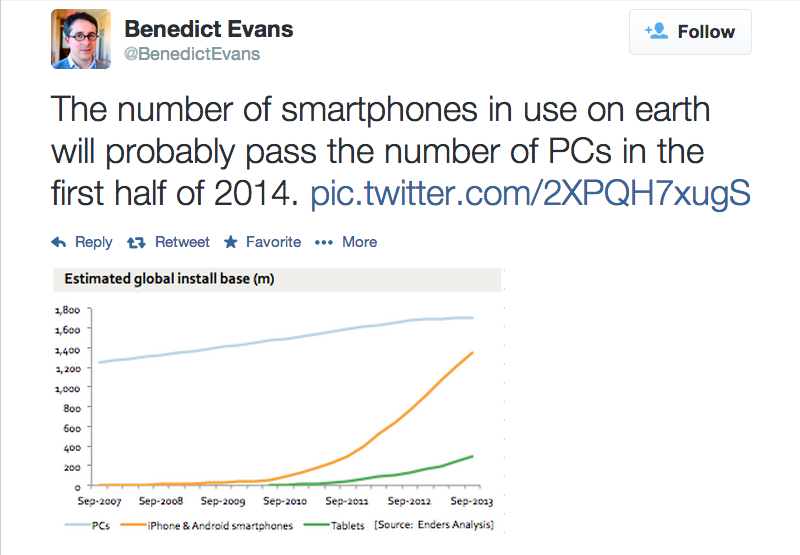Quartz carried
an article about the number of Indians going online will outnumber Americans by 2015. Google’s India representative estimated 500 Millions Indians will be on internet in just four years from now. Smartphones are being purchased at a feverish pace. McKinsey
has reported that in India "Mobile Internet
usage is growing at the rate of nearly 85 percent per annum"
Image courtesy World Bank
The Quartz article also pointed out that tech companies like Facebook are only earning just 0.23% of its revenue
from the 7% of its users who are in India.
Google is also not immune to this large-user-base-but-low-revenue situation. It is a common knowledge that the
average Cost-Per-Click in India is often way below that in the US (or in other developed countries). Even
in US, Google is grappling with the low CPC mostly from
the mobile users.
Just Adding Numbers is not enough
The issue is while the online traffic is exploding in India, internet
enterprises generally expect the same business model to hold and revenues to scale. However, transplanting a business model
rarely works.
A better approach lies in aligning with the local user behavior and, in India's case, devise a way to work with the long tail. This would require thinking away from a website centric approach to internet (text based searching maybe?)
A better approach lies in aligning with the local user behavior and, in India's case, devise a way to work with the long tail. This would require thinking away from a website centric approach to internet (text based searching maybe?)
Some Tech companies have begun experimenting with different models
that would be better suited for India.
For example, Google’s strategy for reaching out to this rapidly growing
number of internet users revolves around pushing more of low cost Android
smartphones into the internet hungry population- the Andriod
One.
But does that meet the demand directly?
McKinsey has found (in the same report referenced above) "...that 75 percent
of non-voice usage being devoted to entertainment, where video and music
streaming are major growth activities."
Indian online users are big on media consumption, online research and, of course, spending time on Facebook. Another report has come up with the following
Indian online users are big on media consumption, online research and, of course, spending time on Facebook. Another report has come up with the following
Image courtesy Yourstory
While an Android platform will give Google
leverage in the long run, but it will not necessarily address the current user demand for entertainment and social networking.
Social over Mobile
Facebook appears to have taken a different approach that is resonating better with the customers. Mobile carriers in India are selling cell phone plans that tout Days of Free Facebook time on the smart phone data plan. The social networking giant has rolled out a service that does not require the users to purchase a data plan to spend time on Facebook.
A country where a significant share of rural population
is still semi literate, a plan that is user friendly and talks in terms
of Facebook and YouTube access would have an immediate attraction. I have heard
youngsters in small towns ask for a Free Facebook plan while purchasing prepaid
services.
Facebook has also reportedly optimized its ad services to run on relatively slower internet connection.
In contrast there are no plans from Google that people know
about. The search giant could easily offer free YouTube access on mobile phones to capitalize on the huge demand for “entertainment."
Typically users in small town with no/sketchy internet buy 4-5 minutesof music video clips or movie clips on SD cards for INR 20 ($0.34) to watch on their mobile phones. This market is ripe for Google to offer YouTube services at a low data cost. It is only recently Tata Docomo has launched a low cost YouTube access.
Or take for example Google’s GTalk. People love to chat and Indians are no exception (early adopters of WhatsApp)
Users can immediately relate to and engage with plans that are centered around such services. Simplicity is the key when trying to woo the large user base in India.
Typically users in small town with no/sketchy internet buy 4-5 minutesof music video clips or movie clips on SD cards for INR 20 ($0.34) to watch on their mobile phones. This market is ripe for Google to offer YouTube services at a low data cost. It is only recently Tata Docomo has launched a low cost YouTube access.
Or take for example Google’s GTalk. People love to chat and Indians are no exception (early adopters of WhatsApp)
Users can immediately relate to and engage with plans that are centered around such services. Simplicity is the key when trying to woo the large user base in India.
In India the long tail will be getting even longer as National Optical Fiber Network kicks off in few years.













